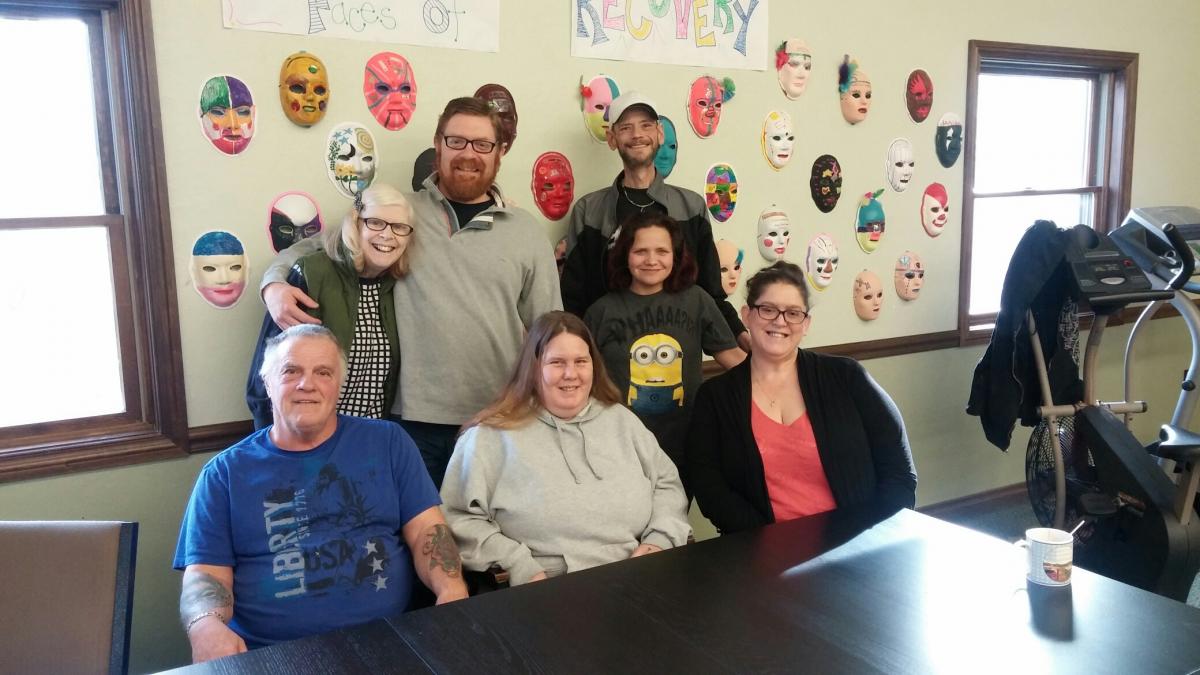
For the better part of a year, J.R. Frost would walk into Recovery Zone. Without saying a word, he’d grab a cup of coffee, walk out to the front porch, sit on the swing, and stare off into the distance. All day. Every day.
The depressed Bellefontaine man had suicidal thoughts after suffering a serious injury that prevented him from going to work. He came to Recovery Zone to find himself.
“I believe I would be dead if Recovery Zone weren't here,” J.R. said in January, nearly five years after he first walked through the door. “It probably would have been too much pressure. ‘What am I here for? What is my purpose?’ I have great purpose now.”
Now, J.R. is employed as Recovery Zone’s Maintenance Director, overseeing the facilities of the peer-led mental health and addiction support center on Bellefontaine’s west side. Recovery Zone is one of United Way’s newest Funded Agencies, receiving a $15,000 allocation in 2017 to help people like J.R. overcome their battles with mental health and addiction.
From not talking to anyone, J.R. now goes out of his way to greet everyone who comes to the center. And he’s involved in just about every activity that takes place here. Though he still has good days and bad days, he says he’s about 90 percent of the way toward moving beyond his depression. And he’s been empowered to help others work through their cases.
“Stability is what it’s really given me,” he said. “There’s actually somebody out there that cares what happens to me. I don’t have to face this every day of my life and not be able to do anything about it. I’m outgoing. I like to sit and talk with people. If someone comes in the door, I’ll go up and talk with them and make them feel welcome. That gives me gratification. I can help people the way I was helped.”
"A big part of recovery is isolation,” explains Ross Cunningham, Executive Director of Recovery Zone. “That doesn't just mean being alone. People may be in a group of people, but there's a huge feeling that you are going through issues by yourself. What we try to do is create a new community of people who are trying to do good things in their lives, are trying to make changes, and want to support each other. Not just professional support, but friendship and a place where you can go to be a part of something.”
Lives are transformed at Recovery Zone, one day at a time. Mary Cox of Bellefontaine took her first drink when she was 12 years old and has been fighting for sobriety for the better part of 30 years. She says she isolated herself at home and started coming two years ago to find clean, sober people to be around who wouldn’t judge her and would accept her for who she is. Now she leads a weekly Bible study, helps cook the meals that are served daily, and participates in other classes and offerings.
“I still have room to go,” she admits. “I hate days they're closed because I don't know what to do with myself. I come in here every day. They say you're an addict for life. I know people who come to the meetings who have been clean for 30 years and come to the meetings to stay clean. It's a lifelong process.”
Recovery Zone offers a no-guilt, no-shame, no-judging environment with peer-led support groups and activities. They stress that those with mental health diagnoses and recovering addicts are good people with talents and gifts to share with others. Those with recovery stories have great resiliency and strength.
“I had no idea there was a place out there that could help people,” J.R. remembers. “When I was growing up, mental health issues weren't discussed. If you had a problem, nobody would want to be around you because they'd be afraid you'd do something. But now, the thinking is totally different.”
It costs nothing to come to Recovery Zone, which is always open from 10:00 to 2:30 on weekdays and on weekends for activities and groups, like Alcoholics Anonymous.
 “People can come here and make this their own place,” Ross said. “It's not just about coming here to receive services. It's also about coming here to volunteer your own services to other people in recovery. If you're a great cook, you can come here and cook a meal and enjoy it with others. If you like to sew, you can come here and sew and show other people how to do it. It's about bringing your own gifts to this place.”
“People can come here and make this their own place,” Ross said. “It's not just about coming here to receive services. It's also about coming here to volunteer your own services to other people in recovery. If you're a great cook, you can come here and cook a meal and enjoy it with others. If you like to sew, you can come here and sew and show other people how to do it. It's about bringing your own gifts to this place.”
And if you need a place to swing on the porch for a year, you can come and do that too.
For more information, visit www.recoveryzonelcc.org or call (937) 593-9391.
